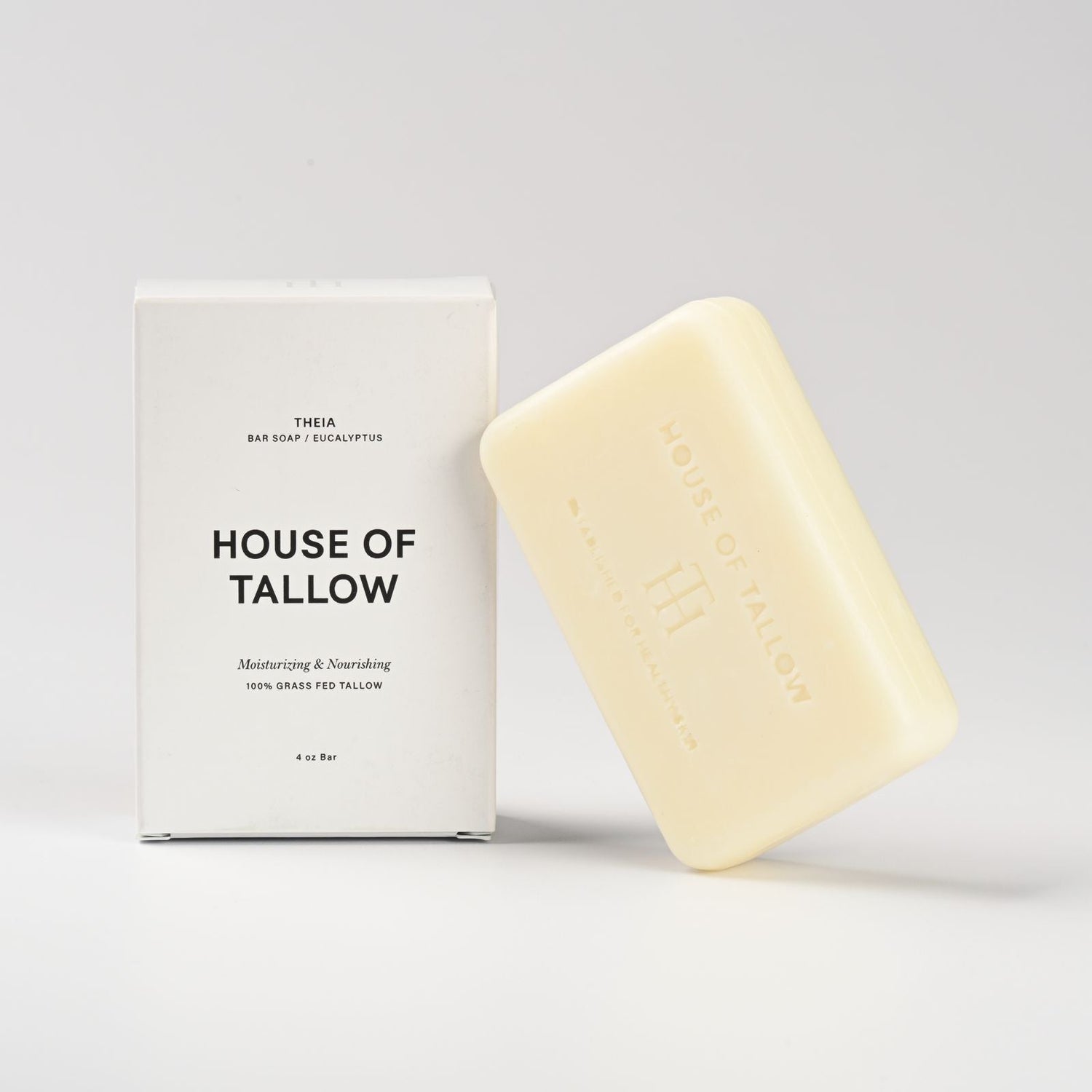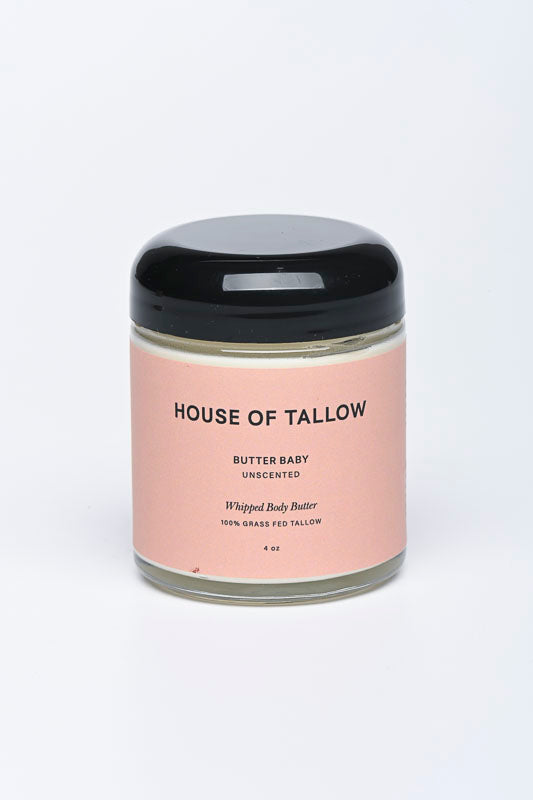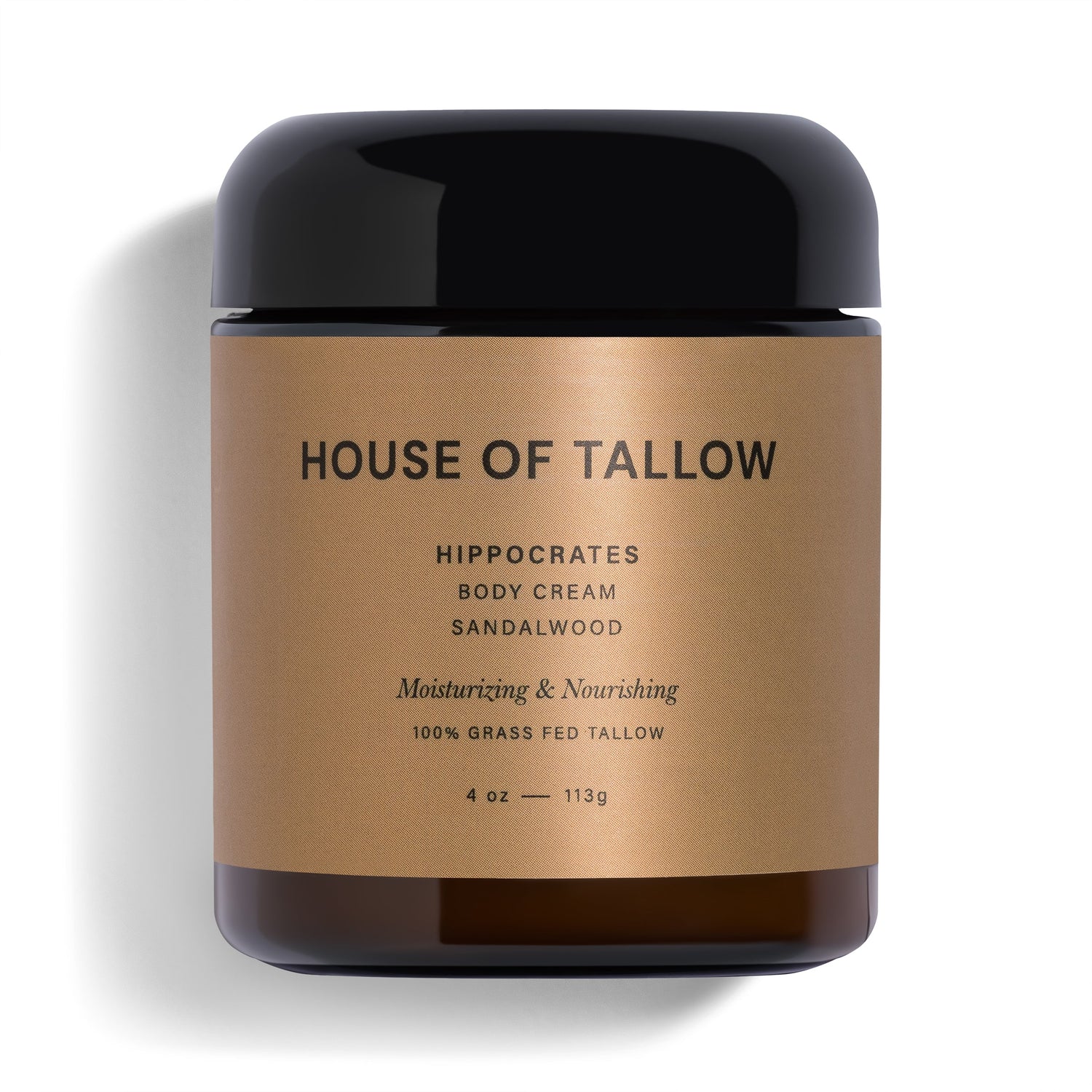Tallow, a natural fat derived from animals, is rich in skin-nourishing vitamins and fatty acids that mimic human sebum, making it an effective ingredient for skincare. Here’s a quick look at the key vitamins in tallow and their skin benefits:
- Vitamin A: Promotes cell renewal and supports collagen production.
- Vitamin D: Strengthens the skin barrier and reduces inflammation.
- Vitamin E: Provides antioxidant protection and aids in moisture retention.
- Vitamin K: Supports healing, reduces dark circles, and improves skin texture.
- Vitamin B12: Encourages cell growth, reduces dryness, and protects against UV damage.
- CLA (Conjugated Linoleic Acid): Enhances moisture retention and calms irritation.
- Vitamin B3 (Niacinamide): Improves the skin barrier, hydrates, and reduces oil production.
Grass-fed tallow is especially nutrient-rich, offering higher levels of these vitamins and fatty acids for deeper skin nourishment. With its anti-inflammatory and moisturizing properties, tallow is a natural solution for healthier, glowing skin.
Beef Tallow for Skincare - You Need This!
1. Vitamin A: Cell Renewal and Repair
Vitamin A in tallow acts as a natural form of retinol, promoting skin regeneration with excellent absorption rates . Here’s a closer look at how Vitamin A supports skin health:
| Function | How It Helps Skin |
|---|---|
| Cell Turnover | Speeds up the shedding of dead skin cells |
| Collagen Support | Boosts collagen production for better elasticity |
| Sebum Regulation | Helps balance oil levels for various skin types |
| Pore Health | Aids in keeping pores clean and clear |
"Vitamin A is vital in promoting healthy skin by supporting cell growth and renewal." - The Healthy Porcupine
The naturally occurring Vitamin A in tallow also encourages collagen production, which can reduce fine lines and wrinkles while enhancing skin texture .
2. Vitamin D: Skin Protection
Vitamin D in tallow supports your skin's natural barrier, helping shield it from external damage. Unlike synthetic products, the Vitamin D in tallow is absorbed more effectively, allowing it to work deeper within the skin.
Here’s a quick breakdown of how Vitamin D benefits your skin:
| Skin Benefit | How Vitamin D Helps |
|---|---|
| Inflammation Control | Calms redness and irritation |
| Cell Regulation | Supports healthy skin cell turnover |
| Barrier Protection | Strengthens the skin's defense system |
| Moisture Retention | Helps prevent dehydration and water loss |
Experts emphasize its role in managing environmental stress:
"Generally speaking, skin health is best improved when your body has a full store of vitamin D."
"The most important practical use of Vitamin D in the skin to date is as a mild-to-moderate anti-inflammatory, used clinically as a cream in the treatment of conditions like psoriasis, eczema, and vitiligo. Vitamin D dials down exuberant inflammation, alleviating symptoms for those suffering from these conditions."
When combined with the fatty acids in tallow, Vitamin D offers additional benefits:
- Deep hydration
- Better resilience to external stress
- Regulated skin cell turnover
- A balanced inflammatory response
3. Vitamin E: Antioxidant Protection
Vitamin E is the most plentiful fat-soluble antioxidant in human skin, playing a key role in shielding it from damage caused by daily stressors and UV exposure. By neutralizing reactive oxygen species (ROS) and absorbing UV light, it helps protect skin cells and slows down signs of aging.
Here’s how Vitamin E benefits the skin:
| Protection Type | How Vitamin E Works |
|---|---|
| UV Defense | Absorbs UVB rays and reduces inflammatory responses |
| Free Radical Defense | Neutralizes harmful reactive oxygen species (ROS) |
| Moisture Support | Strengthens the skin's natural moisture barrier |
| Anti-Aging Benefits | Helps maintain elasticity and reduces fine lines |
"It probably makes moisturizers work better, but it's unclear in most studies if it has a direct medicinal role. Its effects are fairly subtle. It doesn't treat any particular skin condition other than helping a bit with general skin aging and lack of moisture."
Pairing Vitamin E with Vitamin C has been shown to amplify skin protection. Lucy Gildea, Ph.D., explains:
"Vitamin C is essential for skin health. The addition of vitamin E makes it even better."
Key Points About Vitamin E
- It naturally diminishes with age and UV exposure .
- It contributes to the skin's antioxidant defenses .
- It helps guard against UV-induced free radical damage .
Clinical studies highlight its effectiveness: 84% of participants noticed fewer fine lines when using Vitamin E-enriched products .
For the best results, try products that combine Vitamin E with Vitamin C. These two antioxidants work together to boost skin protection, setting a strong foundation for the healing benefits of Vitamin K.
sbb-itb-a1b9fc0
4. Vitamin K: Healing Support
Vitamin K in tallow plays a key role in supporting skin repair and healing through various processes.
Clinical Evidence of Healing Benefits
A randomized controlled trial found that using a 1% Vitamin K cream sped up wound contraction and shortened recovery time compared to Eucerin .
| Healing Benefit | How Vitamin K Works |
|---|---|
| Wound Healing | Speeds up wound contraction and aids epithelialization |
| Tissue Formation | Encourages development of fibroblasts, collagen, and blood vessels |
| Blood Circulation | Boosts local blood flow, aiding the healing process |
| Inflammation | Provides anti-inflammatory and antioxidant effects |
Board-Certified Dermatologist Y. Claire Chang, MD, highlights:
"Vitamin K may improve wound healing by increasing wound contraction and helping in the formation of collagen and blood vessels."
Specific Skin Benefits
Vitamin K is particularly helpful for improving:
- Dark under-eye circles
- Spider veins
- Stretch marks
- Acne scars
- Rosacea
Cosmetic Chemist Ron Robinson shares:
"Given that vitamin K plays an important role in blood clotting, applying it to the eye area might help prevent the capillary leaking and therefore lessen the look of dark circles."
Research also suggests that Vitamin K works even better when combined with other active ingredients. A 2015 study showed noticeable improvements in wrinkles and dark circles when participants used pads containing Vitamin K and caffeine in an emu oil base . Similarly, a 2004 study demonstrated enhanced results when Vitamin K was paired with retinol and Vitamins C and E .
Vitamin K's gentle effects set the stage for Vitamin B12's role in cell growth. Up next, explore how Vitamin B12 supports cell regeneration.
5. Vitamin B12: Cell Growth
Vitamin B12 found in tallow plays a key role in skin cell renewal, helping maintain a youthful appearance.
How Vitamin B12 Supports Skin Health
Research reveals that Vitamin B12 contributes to healthier skin through several important functions:
| Skin Function | B12's Role | Impact |
|---|---|---|
| Cell Energy | Fuels ATP production, aiding cell and DNA repair | Boosts cellular energy |
| Collagen Production | Promotes collagen synthesis | Strengthens skin structure |
| Moisture Balance | Helps retain natural skin hydration | Reduces dryness |
| Inflammation | Reduces inflammasome activity | Lowers IL-1β production by 35% |
| Barrier Integrity | Protects against damage caused by inflammation | Preserves skin's defense |
These benefits make Vitamin B12 a powerful component in tallow, helping the skin stay resilient and better equipped to handle external stressors.
Defense Against Environmental Stress
Vitamin B12 has been shown to strengthen the skin's defenses against UV damage. Research highlights that B12 supplementation can increase miR-22-3p levels by 61%, reduce mast cell degranulation by 27%, and lower inflammatory cytokine production by 35% .
Combatting Skin Issues
Low levels of Vitamin B12 have been associated with skin problems like dryness, UV sensitivity, and hyperpigmentation. Studies suggest that maintaining adequate B12 levels can alleviate UV-induced skin sensitivity and other stress-related issues by reducing inflammasome activity .
This nutrient's ability to support cell growth complements the moisture-retaining properties of CLA, which will be discussed next. Together, they work to protect and hydrate the skin effectively.
6. CLA: Moisture and Protection
CLA, found in grass-fed tallow, helps strengthen the skin's moisture barrier. Alongside tallow's vitamins, it supports skin repair while offering added protection.
How It Boosts the Skin Barrier
- Helps retain essential moisture
- Minimizes water loss through the skin
- Shields against external irritants
Studies reveal that applying CLA topically aids in repairing the skin barrier and improving overall hydration levels .
Why Grass-Fed Tallow Stands Out
Grass-fed tallow contains 2-4 times more CLA compared to grain-fed tallow . This higher concentration can amplify its skin-nourishing effects.
Benefits Across Skin Types
| Skin Type | Benefits | Key Actions |
|---|---|---|
| Dry Skin | Better moisture retention | Strengthens the barrier |
| Sensitive Skin | Calms irritation | Reduces inflammation |
| Compromised Skin | Supports healing | Enhances barrier function |
| Normal Skin | Maintains hydration | Reduces water loss |
"As an omega-6 fatty acid, CLA plays a crucial role in skin health, helping to maintain the skin's barrier, preserving moisture, and protecting the skin from harmful environmental factors." – Brittany Hogan, Author at Nefertem Naturals
On top of locking in moisture, CLA also has anti-inflammatory properties . This combination of hydration and protection lays the groundwork for the benefits of Vitamin B3, which further reinforces the skin barrier.
Up next: Learn how Vitamin B3 takes skin barrier care to the next level.
7. Vitamin B3: Barrier Function
Vitamin B3, also known as niacinamide, helps strengthen the skin's natural barrier. It promotes the production of ceramides - the 'cement' that holds skin cells together - and boosts barrier proteins like keratin, involucrin, and filaggrin .
| Concentration | Benefits | Best For |
|---|---|---|
| 2% | Reduces oil production and may alleviate eczema symptoms | Sensitive skin |
| 4% | Comparable to 4% hydroquinone for treating dark spots | Hyperpigmentation |
| 5% | Ideal for general barrier repair | All skin types |
Hydration Benefits
Vitamin B3 plays a key role in improving skin hydration by:
- Reducing water loss through the skin
- Increasing natural hyaluronic acid levels
- Boosting moisture in the outer skin layer
"Topical application of niacinamide has a stabilizing effect on epidermal barrier function, seen as a reduction in transepidermal water loss and an improvement in the moisture content of the horny layer." – PubMed Abstract
Defense Against Environmental Stress
Beyond hydration, Vitamin B3 helps protect the skin from external stressors.
"Vitamin B3 benefits are numerous; it can strengthen your barrier function, the first line of defence against environmental aggressors like UV exposure, pollution, and irritants." – Samantha Miller, The Naked Chemist
Studies suggest that even a 2% concentration of Vitamin B3 used daily can regulate oil production while maintaining the skin's barrier .
For best results, apply Vitamin B3 after toner and before moisturizer. Avoid using it at the same time as Vitamin C .
Conclusion
Tallow is packed with key vitamins that help repair skin, strengthen its protective barrier, deeply moisturize, combat free radicals, and ease inflammation - all highlighting its role in natural skincare .
Its composition closely resembles human sebum, which helps the skin absorb nutrients more effectively . Plus, grass-fed tallow offers up to four times more nutrients compared to conventional options, amplifying the impact of each vitamin .
For those interested in these benefits, House of Tallow provides grass-fed tallow-based products enriched with skin-loving vitamins. One satisfied customer shared:
"I have been using my tallow for a couple of weeks and my skin is glowing! All of my acne issues have resolved. I am loving it! Best skin care product I have used!"
Thanks to its natural anti-inflammatory and antibacterial qualities, grass-fed tallow works in harmony with your skin, offering a thoughtful and effective skincare option .




